Extra Credit! Due Tuesday, January 5, 2010
As you celebrate the New Year, take a few minutes to think about something you could do to improve your life or make yourself a better person. You new year's resolution should be something that you dedicate yourself to for the duration of 2010 - in other words, set an on-going goal for yourself and start working toward it immediately.
Think carefully. What are your shortcomings? What about you needs improvement? What types of things could you do now to help you achieve your goals in the future?
For instance, if lack of organization is keeping you from reaching your maximum academic potential, you may resolve to put everything in it's place rather than just shove things in your backpack, desk drawers, closet, etc. Or maybe you feel so tired after school that you tend to confine yourself to the couch and watch t.v. all afternoon and you feel like you don't have much fun on the weekdays. You could resolve yourself to exercising or eating a nutritious snack when you get home to get your energy level up and then head out with friends and have fun before dinner.
Think for a while about what you would like to improve about yourself or your life and make a new year's resolution. Write at least two paragraphs - one focusing on your inspiration for this goal (your shortcomings or areas for improvement) and the other focused on the goal itself and your on-going plan for achievement.
This needs to be realistic and must be something you can work on every month of the year - not just during one sport season, etc. The goal does not have to be academic. Plan carefully! I'm going to check in with you on this throughout the second half of the school year.
Good luck and happy 2010!
Robert The Great
9 years ago
